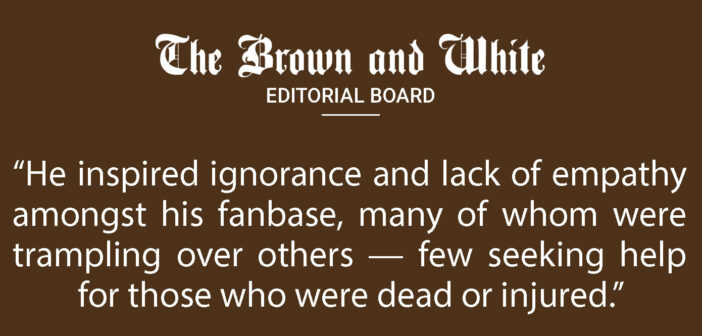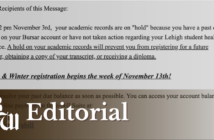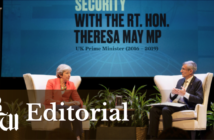As we emerge from a pandemic, attending a concert is a bucket-list item for many who are thrilled to get back into the swing of normal activities.
During the first weekend of November, rapper Travis Scott planned to hold a two-day concert in Houston, Texas – otherwise known as the “Astroworld Festival.”
As a Houston native himself, Scott expected this event to be nothing short of “crazy.” On Nov. 5, the first night of the festival, thousands of fans staggered into the venue – exhilarated to see the performance of a musician they idolized.
For most of those fans, that first night panned out to be nothing short of harrowing.
Amid the short two hours of the concert, eight people died. Hundreds of others were injured, with 25 people being transported to hospitals and 300 people treated at the on-site hospital.
More than 50,000 people attended the concert that night. A crowd of rowdy fans was compressed toward the stage, packed up against one another like sardines in a can.
The majority of the deaths and injuries were allegedly caused by suffocation and trampling. The venue was packed to the brim with fans screaming, shouting, jumping and dancing – without a care in the world and unaware of their surroundings.
As multiple people were buried to the ground, EMTs and security shuffled through the crowd. Despite this, the show continued.
Numerous videos show attendees climbing directly onto the stage, screaming at Scott and the showrunners that there are “dead people in the crowd.”
Yet, the show continued. Reports indicate that Scott paused the concert at least twice, although the show went on to run nearly its full course. Scott had the concert continue as his fans died or were hurt from a riotous, over-packed crowd.
The rest of the Astroworld concerts were canceled soon after this night.
Scott publicly denied realizing all of this happened while he was performing. Nonetheless, the fans screaming in terror and the ambulances amid the crowd were right before his eyes.
Why did the show go on? Other performers such as Dave Grohl and Linkin Park have previously seen audience members suffering in the crowd, immediately stopping their shows to help their fans seek care.
Even with a deadly tragedy, Scott did nothing of the like – despite the apparent distress and panic within the crowd.
Should we be surprised that the show never stopped? Not necessarily.
Scott has previously been arrested for inciting riots in Arkansas, where audience members were injured. Through a series of Tweets, he inspired his fanbase to bypass security and the barricades for the sake of his concert.
Regardless of this incident, his attitude didn’t budge before the Astroworld tragedy. In a now-deleted Tweet from May, Scott once again incited violence, encouraging fans to break into his concert despite not having tickets.
Fans did just that at this concert, breaking into the venue and rushing toward the front of the stage.
Scott knew what he was doing. Yet, he treated the consequences of his actions with ignorance. By inciting dangerous actions amongst his fanbase, Scott is, without a doubt, at fault for this tragedy.
He inspired ignorance and lack of empathy amongst his fanbase, many of whom were trampling over others — few seeking help for those who were dead or injured.
While he holds nearly full responsibility, an immense part of his large fanbase blindly followed him. They dismissed the fact that bursting into a concert and piling to the forefront of the stage might cause some kind of harmful consequences.
Are rowdy attendees one of many things that we now have to fear when we attend concerts? Although this kind of incident has happened in the past, this is no less shocking and feels new.
People were being resuscitated all over the venue while others ignored it and continued jumping around – all because they idolized this man.
Celebrities like Scott hold extensive power when thousands of people idolize them.
We blindly tread on the heels of our idols without thinking for ourselves and others – forgetting to think about the consequences that would follow.
Scott had some control over the situation – he had a say in its outcome. He should and will be held responsible for the damage he’s done to his fanbase.
Yet, it leads us to think, as fans of whoever: can we trust who we idolize?
We are individually responsible for our own actions – regardless of whoever we admire and their power of persuasion.
Think through the potential consequences of your own actions and how it will affect yourself and those around you.
This incident should have never happened in the first place, being completely avoidable in the first place.
Nobody should be fearing for their life when attending a concert or other large-scale events.






Comment policy
Comments posted to The Brown and White website are reviewed by a moderator before being approved. Incendiary speech or harassing language, including comments targeted at individuals, may be deemed unacceptable and not published. Spam and other soliciting will also be declined.
The Brown and White also reserves the right to not publish entirely anonymous comments.
2 Comments
“While he holds nearly full responsibility”: I disagree based upon information I heard on public radio. Just as there are designated drivers, there are professionals who view concerts and have the ability to stop them when conditions indicate things are out of control. The blame lies there unless those who hire such people were negligent.
Travis Scott’s persona promotes wild and crazy not mom or dad but he and his handlers are not stupid. They may relish the perception of danger but don’t want actual injuries.
“We are individually responsible for our own actions – regardless of whoever we admire and their power of persuasion.” Wise words that are well worth reading often if not daily and following many times more than that.